by Fope Ojo
It would be a pity if we should ever forget or fail to acknowledge that before many things, the Aké Arts and Book Festival is about giving back. Yesterday, the students came to us to learn about their environment. Today, we went to the students to teach them about writing and literature.
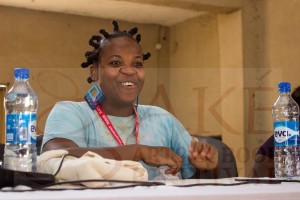 I am the volunteer assigned to accompany two guests Mazi Nwonwu — a Nigerian writer and editor, and Zukiswa Wanner — a Zimbabwean and South African author. They are going to talk to the students at the African Church Grammar school in Abẹ́òkuta about writing and literature.
I am the volunteer assigned to accompany two guests Mazi Nwonwu — a Nigerian writer and editor, and Zukiswa Wanner — a Zimbabwean and South African author. They are going to talk to the students at the African Church Grammar school in Abẹ́òkuta about writing and literature.
Mazi Nwonwu is a funny man with a bubbly personality.
When they are first assigned to my team, Mazi says that he must buy Zukiswa a beer for something that she has done. Zukiswa says that beer is free upstairs so he should buy her a book instead.
He runs off to get his own book for her, comes back without it and then goes to buy it from the Aké Bookshop. As he signs the book for Zukiswa, he explains how he forgot to bring his book.
“Where I’m from,” he says “if you forget something my people say that there is oil in your eyes so now, there is oil in my eyes.”
Zukiswa says “Well at least it’s working in my favour” and we all have a good laugh.
He asks her if she has any copy of her own books with her and she says no but that they are all in the Aké Festival Bookshop.
“I hope your book is not one of the ones for 3000 naira” he says “because I saw some for 3000 naira.”
She tells him that her books are not 3000 naira. And he says okay, he’ll buy them then.
Zukiswa wears a blue booboo and does her hair in Bantu knots. She also wears big blue earrings with different triangles and different shades of blue. She goes through the festival guide thoroughly, trying to decide which events she will attend. She asterisks the ones that she’s attending with a blue pen.
When it is time for us to leave, on LS’s instructions we enter the white bus assigned to us.
“Why is it that all the buses that I’ve entered in Abẹ́òkuta and Ìbàdàn are always so beat up?” Mazi asks.
Someone in the bus answers and says that it is because the owner of the buses do not care to maintain the buses and we all agree.
Our drive to the African Church Grammar school is short. We climb this bridge that is lined with white and black. Mrs. Adédoyin Olúgbèmí is seated in front. She is from the ministry of education, the one who has helped with the selection of the lucky schools to which the different groups of authors will pay visits.
When we get to the gate of the school, she asks the security woman for the senior principal’s office and the security woman directs us. The children are dressed in their yellow and white uniforms which are predominantly white with a touch of yellow.
It seems as though the secondary school nostalgia hits all of us because Zukiswa jokingly says, “I would not like to learn at this school. The uniform is all white.”
Then Mazi tells us that when he was in secondary school, his uniform too was all white. He talks about how he as a student, after classes, played ball in his white uniform not caring about the colour of his uniform.
We enter into the hall and the students are seated patiently awaiting the guests. The principal and vice principal and some other teachers welcome us. They have glorious smiles on their face and they seem very grateful. They have set up a high table on the stage for the guests.
The hall is rather large and the students fill up half of the space. The ceiling is dramatically battered and looks as though it would buckle any minute and give way to disaster. But the children sit comfortably underneath.
The event kicks off with introductions after which Zikuswa who reads a section from her book to the children.
“I want to read a section of my book to you”, she says “just to show you that there are exciting things happening in Kenya”
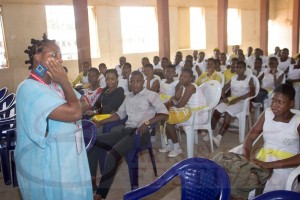 After this, Mazi tells them a story about a student just like them, who would come to a school like theirs, play ball everyday, get tired and then go to the library to read. How this student realised that through books, he was able to travel. From Kaduna to Paris without ever being there physically. How he even began to know the streets of Paris through books and then fell in love with the power of books.
After this, Mazi tells them a story about a student just like them, who would come to a school like theirs, play ball everyday, get tired and then go to the library to read. How this student realised that through books, he was able to travel. From Kaduna to Paris without ever being there physically. How he even began to know the streets of Paris through books and then fell in love with the power of books.
By now, Mazi and Zukiswa have come down from the stage. They are walking amongst the students and asking questions.
“Tell us your favourite book.” Zukiswa says “Anyone of you here want to tell us what your favourite book is?”
The students are shy at first but later one student raises up her hand and answers. The next student that answers says “encyclopedia”.
Then the students start to ask their own questions. From then on it is a long barrage of questions and answers.
How do you get the title of the novel?
Zukiswa answers this question and says “I guess the most important thing is to write the story first.”
She then goes further to say that maybe when you write the story, then you can pick a title according to the theme of the book or an interesting statement in the book that you like.
Another boy raises his hand and asks “Do you do freestyle writing, like do you pick up a pen and write or do you always wait for inspiration?”
Zukiswa answers and says that she always forms the story in her head first.
“How long does it take you to write a novel?”
Zukiswa and Mazi both answer and say that it depends on what you’re writing.
“What does it take to be a good storyteller?”
“It takes reading a whole lot,” Mazi says “It takes reading and asking a lot of questions.”
“When you listen to people and you read a lot you would know that certain characters would never say some things,” Zukiswa adds.
“Why do you want to write?” Mazi asks them almost impulsively.
“Why do you want to tell this story? You have to answer that to yourself. It’s very important.”
“I’m waiting for questions along the line of careers,” Mazi says.
A student plays into his bait and asks what careers a writer could have. He throws the question back to the students and they answer.
“Reporter!” a student says.
“Musician,” says another.
“Speech writer,” says the third.
“There are so many things you can do just because you can write. And for you to be able to write, you need to read,” Mazi adds. His mantra seems to be that the students must read and read a lot.
“How do you feel when people misuse the things you’ve written?” Another student asks.
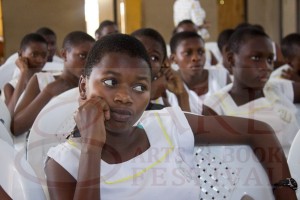 Mazi then talks about his experience while listening to Galaxy Television. How they had used an article he had written about music for one of their programs. He talks about how it at first sounded familiar but he was still unsure and how bad he felt when he realised that it was his article they had used without his permission.
Mazi then talks about his experience while listening to Galaxy Television. How they had used an article he had written about music for one of their programs. He talks about how it at first sounded familiar but he was still unsure and how bad he felt when he realised that it was his article they had used without his permission.
“What’s your major challenge as a writer?”
“People don’t want to pay. People want you to do it for free,” Mazi says.
“People look at writers like people who don’t want the things that everybody else wants. They look as writers as though they just want to be in the bush writing stuff.”
“As a writer, is it a possible to be a film producer?”
“Of course!”
Zukiswa tells them how important it is to know how to write. She goes on to say that if you think about it. It is more difficult to get a job if you don’t know how to write. Think about the CV, the cover letter, all those things that need to be written.
A student asks about associations for writers.
Mazi and Zukiswa say that there are so many associations. Association of Nigerian Authors, ANA is one.
“Why do you love to write?”
There are too many stories in my head, Mazi says, with regards to his fiction writing and with regards to journalism, he says he likes to point out injustice.
“I love writing because I just like the idea of telling stories,” Zukiswa says.
Can a science student excel more in arts than an arts student. They bring up Dami Ajayi and Eghosa Imasuen. About how they are medical students but are doing very well as poets and writers of fiction.
“Achebe and Chimamanda started off as medical students,” they say.
“Even I started off as a medical student,” Zukiswa says.
“Which writers do you like?”
Zukiswa says that she’d rather talk about her favourite books than favourite authors. Because she finds that she can like only two out of five books from the same author.
“The good books teach me the things I should aspire to as a writer and the bad books teach me what not to write,” she says.
“What are challenges as a writer?”
She says social media is one of her biggest challenges. The noise and the distraction too. But you write because you love it.
“It is starting and finishing.” Mazi answers too. “That’s one of the biggest challenges for creatives. The same way you want to watch Telemundo is the same way I want to. So I have to find balance.”
“Why do writers change their names?”
Mazi answers and says “People think that exotic names would make them more noticeable. Other people just use names that mean something to them.”
“What does writers block mean?”
“I don’t know whether Mazi believes in writer’s block. I don’t believe in writer’s block. Sometimes maybe that story just isn’t ready to be told.” Zukiswa answers.
Mazi says that he kind of believes in writer’s block.
“The people who write a lot never talk about writer’s block.” Zukiswa says “I have noticed that the writers who make a lot of noise about writer’s block are the ones that don’t write a lot.”
“Can a writer steal ideas from another book?”
“Yes. Read a lot. The environment is also good for writing. Depends on your personality. I can’t write in a quiet place,” Zukiswa says.
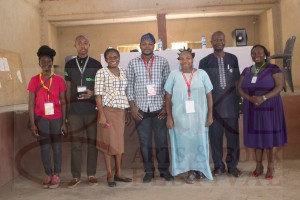 In most cases you write in your environment. The same you can tune out when you’re reading is the same way you can tune out when you’re writing, Mazi tells them.
In most cases you write in your environment. The same you can tune out when you’re reading is the same way you can tune out when you’re writing, Mazi tells them.
“You said a writer can have other professions but won’t it be a distraction?”
A lot of writers have other professions. And sometimes it can be great material. In my last book, my character was an archurial scientist. So I had to do a lot of research about what it was like to be an actuarial scientist, Zukiswa says.
She then talks about Dami Ajayi or Eghosa Imasuen deciding to write a book and making the setting a hospital. How they would know how everything would run.
“Are there some basic steps a writer must follow to become successful?”
Write. Submit stuff. It depends on the writer’s personality. There are writers that write beautiful stuff want to stay indoors. Other writers write and put themselves out there and tweet a lot. Like Elnathan John.
“What if I write and I don’t have money to publish?”
“Do you have access to a computer?” Zukiswa asks.
“No.” the student answers.
“So you’ve never been to a cyber cafe?”
“I go there when I have assignments.”
Zukiswa advices her to submit her work to online magazines and publishing houses as often as she can.
“If a writer is not making money from writing, what does the writer do?”
Do something else. Do an alternative job. You can do blogging. People get paid to blog.
***
Outside a teacher is flogging a student and I am distracted by his cries. He cries as though he’s having a cough seizure. I wonder what it is that he has done.
I go back to the room and Mazi is talking about how they always advise writers to have other jobs.
“What are your achievements?” Mazi says he has a wife and two children. And the students laugh.
Achievements differ, he says. If I weren’t a good writer, they won’t put me here for one week and pay for my hotel and my feeding. But I haven’t won any awards yet, he says as he laughs. Zukiswa has won awards though. She smiles.
“Can you recommend any books?”
“I hardly recommend books for people. It depends on your personality. It depends on what you like. She asks the student what kinds of books he’s interested in and he says sci-fi.
“If you’re interested in sci-fi, read Nnedi’s Zara the Windseeker
“What’s the highest award a writer can get?”
“The Nobel,” Mazi answers.
“I don’t think it’s the Nobel,” Zukiswa says. “I think it’s the Man Booker.”
She explains that she says this because a Nobel is awarding the whole body of a writer’s work and because the Nobel can also be political. But that the Man Booker is just saying you wrote an awesome book, here have this award.
“Don’t write for awards. Write for the fun of writing.” Mazi tells the students.
“Is it possible for two writers to come together and write a book?”
“Yes. I have a friend who recently did that with her husband,” Zukiswa answers.
Mazi rounds us by pointing out two things from the session.
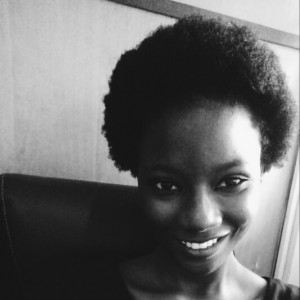
Afọpẹfólúwa Ojó writes from Abẹ́òkuta, as a volunteer at the ongoing Aké Arts and Books Festival. Of herself, she says “Our souls find expression through words, art and music.”
“Whether you want to be a writer or not, read.” He says “Information is key in everything. If you want to be a writer, write. Don’t bother about the money. It will come. I don’t earn my money from fiction writing. I earn it from being a journalist. I write fiction in my spare time.”
He tells the students to go to the cyber cafe and submit their stories.
The Vice Principal ends on a note of thanks. She thanks the writers for coming to teach the students. She thanks Mrs. Adédoyin for choosing African Church Grammar school as one of the lucky schools out of the numerous schools in Abẹ́òkuta. She talks about how Aké came last year and then came this year and that she hopes to see them next year.
We take pictures with the students and teachers and return back to the June 12 Cultural Centre because lunch will soon be served.
No Comments to Aké Diary (III) : Giving Back & Plenty Questions so far. (RSS Feeds for comments in this post)
No one has commented so far, be the first one to comment!